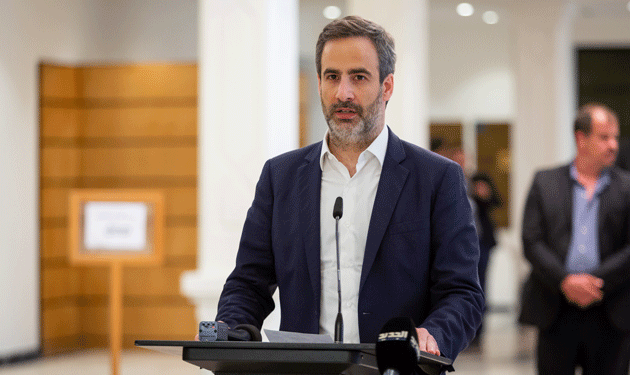The President of “The Independence Movement”, MP Michel Moawad presented a draft law for a “limited general amnesty” concerning crimes related to violations and felonies except those linked to looted public funds, to drug trafficking without any fiscal intention.
In a statement declared in the UNESCO palace, right before the beginning of afternoon’s parliamentary session, MP Moawad confirmed that this draft law aims to reduce injustice without offering a general or partial amnesty or a deal for the future elections. It is based on the principle of sanctions, laws& ethics in our community. He called the Minister of Justice, Marie-Claude Najem to speed up the prosecutions of prisoners who are not included in the amnesty: “Away from the sectarian exploitation, all the Lebanese people should be united. In the prisons, a big number of prisoners are arrested from years ago without being sued. Prisons are overcrowded and this situation is very dangerous especially amidst the Covid-19 crisis. Moreover, thousands of prisoners are arrested by investigation notices, the matter that needs to be solved as soon as possible.”
Mandatory reasons
The mandatory reasons of the draft law are: “Whereas the country is going through a critical situation, especially the Covid-19 crisis, and the government is deploying efforts to limit the spread of the virus; whereas the overcrowded prisons are endangering the prisoners’ life; therefore, it was urgent to present a law that respects this situation and maintains the balance between the safety of the community and the safety of the prisoners, without showing indulgence regarding dangerous crimes in order to support the government’s will in fighting corruption.
Therefore, a draft law was presented to offer amnesty for less dangerous crimes, that constitute the majority, excluding crimes related to looted public funds,
It is notable that the sanctions of the criminal offences can be reduced through the provisions of the sanctions execution amended law number 463/2002 according to law number 183/2011 that can reduce the sanctions due to sickness or good behavior, according to the decision of the competent courts, because releasing prisoners sued in dangerous crimes is a sensitive decision that can endanger the community.
The prisoners who committed these crimes may benefit also from the amendment of article 112 of sanctions which provides for considering the prison year of nine months instead of twelve months; which means that the sanction will be reduced to the quarter.
Moreover, it is important to make a law regarding the arrested persons who spent a long time in prison without being sued; the matter that will give them compensations in case they were innocent.
Draft law text
In the following, the text of the draft law presented by MP Moawad:
One article:
First: general amnesty will be given on the following crimes committed before the law enforcement:
- All violations and felonies except those related to looted public funds.
- Crimes related to drug trafficking without any fiscal intention.
Second: public rights lawsuits, pursuits, pending investigations and provisions included in the amnesty will be dropped. Moreover, all procedures, pursuits, investigation notices, arrest notices and judgments, as well as procedures included in the amnesty will be dropped.
This law does not include the precautionary measures.
Third: the right reference to execute this law before issuing the judgment is the competent judicial authority. After issuing the judgment, the execution power will be given to public prosecution. Contrary to provisions of article /6/ of the law of criminal procedures rules, in case of not issuing a judgment, the public prosecution can ask the competent reference to declare the drop of the lawsuit, in case the criminal was included in the amnesty law according to the provisions of this law.
Fourth: discussing the personal rights resulting from the crime included in the amnesty law will be given to the criminal courts, in case the public lawsuit was discussed before the criminal references before the execution of this law.
The public right lawsuits resulting from a criminal offence included in the amnesty will be transferred to the civil or administrative courts and the latter will apply the fees laws implemented in the civil lawsuits before the criminal courts.
Fifth: outlaws are not included in this amnesty law unless they surrender within three month from the date of issuing the law.
Persons who already had benefit from a previous amnesty will not be included.
Persons who committed several and successive crimes will not be included in the amnesty law, and in case they committed the crimes over again after the law execution, the prosecution will start from the date the amnesty took place.
Sixth: contrary to the law provisions of criminal procedures rules and the military judicial law, the provisions issued by the regular criminal courts or by the permanent military court discussing the crimes before the date of the law enforcement included in the amnesty, will accept the appeal before the court of causation and will be accepted without the need to provide any causation reason and then, the right to restart the prosecution will drop.
Condemned persons who did not present causation requests issued against them can benefit from the provisions of this article, or if their requests were rejected and their appeal limitation will start from the date of the law enforcement.







 العربية
العربية